

Closing the Factory Doors. The Curse of Econ 101. In a rich, post-industrial society, where most people walk around with supercomputers in their pockets and a person can have virtually anything delivered to his or her doorstep overnight, it seems wrong that people who work should have to live in poverty.
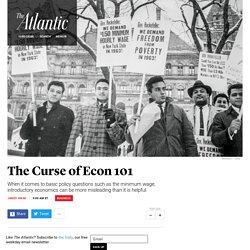
Yet in America, there are more than ten million members of the working poor: people in the workforce whose household income is below the poverty line. Looking around, it isn’t hard to understand why. The two most common occupations in the United States are retail salesperson and cashier. Eight million people have one of those two jobs, which typically pay about $9–$10 per hour. The Conversation About Basic Income is a Mess. Here's How to Make Sense of It. By Charlie Young Universal Basic Income(UBI) is either absolutely bonkers pie-in-the-sky thinking or an ingenious idea whose time has come – depending on whom you ask.
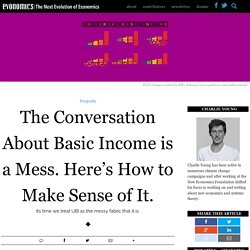
A litany of recent articles argue for and against the idea of giving every resident of a society or economy a guaranteed income stream, usually sufficient to live above the poverty line, regularly and into perpetuity. Those arguing for say that it offers a potential new awakening of cultural expression, as well as dismantling the disincentives to work associated with means-tested benefits, while supporting us through an age of automation, and also creating space for reimagining ownership of the commons.
Those against say that there’s no such thing as free money, that people would simply stop working, that layabouts get enough as it is, and that it could lead to either the dismantling of capitalism or of the welfare state. What Does a Future With No Jobs Look Like? – The Startup. In 1931, at the height of the Great Depression, British economist John Maynard Keynes published the essay “Economic Possibilities for Our Grandchildren”.
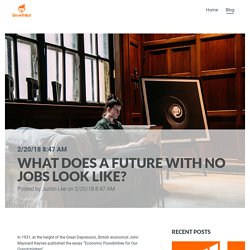
Keynes concluded that the Depression was only temporary and predicted that by 2030, people would work no more than 15 hours a week, devoting the rest of their time to leisure and culture. Keynes was right about economic growth recovering, but most of us work far more than 15 hours a week. We’re still living in a time of over-rapid changes. Technological innovation has fundamentally changed the way we work, but are we really moving toward a society where humans are free to pursue culture and leisure while enjoying an age of abundance?
We’re Living in an Unprecedented Age of Change and Progress. Post-work: the radical idea of a world without jobs. The Real Story of Automation Beginning with One Simple Chart. There’s a chart I came across earlier this year, and not only does it tell an extremely important story about automation, but it also tells a story about the state of the automation discussion itself.
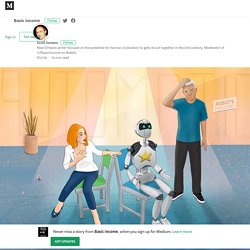
It even reveals how we can expect both automation and the discussion around automation to continue unfolding in the years ahead. Leaving Facebook. Why education won't be enough to compensate for jobs taken over by automation — Quartz. Anyone who has endured back pain knows it is an erratic dictator.
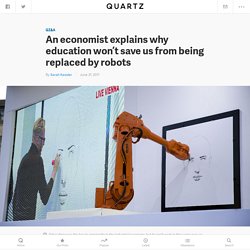
It takes hold of your psyche, demanding your attention and devotion before all else—before you can plan a hike, return to a work routine, pick up your child for a hug. So when someone offers to make that dictator disappear, it’s hard to resist—no matter what the price. “People in pain are poor decision-makers,” says the investigative journalist Cathryn Jakobson Ramin, author of a new book, Crooked: Outwitting the Back Pain Industry and Getting on the Road to Recovery. Millions such bad decisions, she argues, have fueled a $100-billion-per-year back pain industry in the US—one that’s largely selling Americans wrong and even dangerous responses to back discomfort. Extreme Capitalism and the Case for a Guaranteed Income. Protesters with the Occupy Wall Street movement in New York, on November 17, 2011.
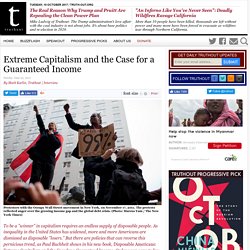
The protests reflected anger over the growing income gap and the global debt crisis. The Future of Work, Robotization, and Capitalism’s Ability to Generate Useless Jobs. By Rutger Bregman A great deal has been written in recent years about the perils of automation.
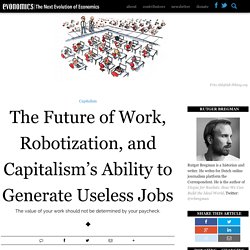
With predicted mass unemployment, declining wages, and increasing inequality, clearly we should all be afraid. The meaning of life in a world without work. Most jobs that exist today might disappear within decades.
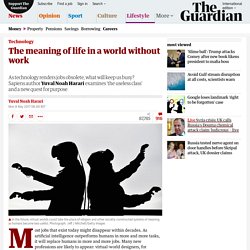
As artificial intelligence outperforms humans in more and more tasks, it will replace humans in more and more jobs. Many new professions are likely to appear: virtual-world designers, for example. But such professions will probably require more creativity and flexibility, and it is unclear whether 40-year-old unemployed taxi drivers or insurance agents will be able to reinvent themselves as virtual-world designers (try to imagine a virtual world created by an insurance agent!). Log In - New York Times. Universal Basic Income Accelerates Innovation by Reducing Our Fear of Failure. By Scott Santens Almost two centuries ago an idea was born with such explanatory power that it created shock waves across all of human society and whose aftershocks we’re still feeling to this day.
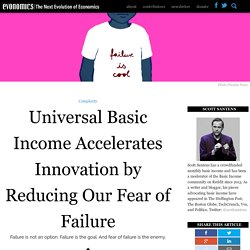
What if jobs are not the solution but the problem? Work means everything to us Americans.
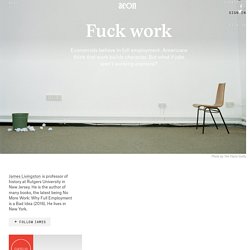
For centuries – since, say, 1650 – we’ve believed that it builds character (punctuality, initiative, honesty, self-discipline, and so forth). We’ve also believed that the market in labour, where we go to find work, has been relatively efficient in allocating opportunities and incomes. And we’ve believed that, even if it sucks, a job gives meaning, purpose and structure to our everyday lives – at any rate, we’re pretty sure that it gets us out of bed, pays the bills, makes us feel responsible, and keeps us away from daytime TV. These beliefs are no longer plausible. New Research Points The Finger At Employers For The Widespread Talent Shortage. The recent hacking of Colin Powell's email accounts prompted juicy headlines about the former Secretary of State's dislike of Donald Trump and withering criticism of Hillary and Bill Clinton.
But it has also revealed plenty of inside details and gossip about drama in Silicon Valley through correspondence related to Powell's role as a board member of Salesforce.com and as a strategic adviser to one of the tech world's most powerful venture capital firms, Kleiner, Perkins, Caufield and Byers. And it provided unprecedented insight into the revolving door between government and industry—complete with its perks, insider deals, and extraordinary access.
When he left the Bush Administration in 2005 after serving as the first African-American secretary of state, Powell was perfectly positioned to take advantage of his new life in the private sector. A decorated military hero and politically moderate and well-respected official, he managed to avoid the bulk of the blame for the Iraq War. Deep Learning Is Going to Teach Us All the Lesson of Our Lives: Jobs Are for Machines – Basic income – Medium. (An alternate version of this article was originally published in the Boston Globe) On December 2nd, 1942, a team of scientists led by Enrico Fermi came back from lunch and watched as humanity created the first self-sustaining nuclear reaction inside a pile of bricks and wood underneath a football field at the University of Chicago. Known to history as Chicago Pile-1, it was celebrated in silence with a single bottle of Chianti, for those who were there understood exactly what it meant for humankind, without any need for words.
Now, something new has occurred that, again, quietly changed the world forever. Like a whispered word in a foreign language, it was quiet in that you may have heard it, but its full meaning may not have been comprehended. Theconversation. Philosophers, economists and other academics have long discussed the idea of “basic income” – an unconditional monthly check from the government to every citizen, in an amount at least high enough to cover all basic necessities. Recently, this idea has gained more political traction: Even conservative parties consider it, and government-initiated trials are running or about to start in Finland, the Netherlands, Canada and New Zealand. One reason this idea has caught politicians’ attention is the fear that large-scale automation will soon put many people out of work permanently, even as economic growth continues. (Truck and taxi drivers are currently the most discussed example.)
Basic income is seen as a solution to the social problems that the predicted “technological umemployment” will bring. Universal Basic Income. Why Capitalism Creates Pointless Jobs. In the year 1930, John Maynard Keynes predicted that technology would have advanced sufficiently by century’s end that countries like Great Britain or the United States would achieve a 15-hour work week. Basic Income: A Sellout of the American Dream.
A universal basic income won't stop people from working–it will change the nature of work — Quartz. A Basic Income Would Upend America’s Work Ethic—and That’s a Good Thing. We have been ruled for years by archaic economic ideas, particularly the claim that a healthy dose of economic austerity is the best way to get the economy’s engines firing again. It is a zombie idea, discredited almost nine decades ago when Herbert Hoover insisted on balancing the budget during a crisis, and sent the economy into a tailspin. Interactive: Charting the Automation Potential of U.S. Jobs. An economic experiment in California will give citizens free money, but big questions remain. Silicon Valley's most well-known startup incubator will soon be experimenting with a centuries-old economic idea in an effort to study how assured monthly income could modify tech's economic impact in a future where technology takes our jobs.
Y Combinator (YC) is launching a very small basic income pilot program later this summer in Oakland, California. What If Everybody Didn't Have to Work to Get Paid? Why Is Productivity So Weak? Three Theories. Modeling basic income - does it add up? - Data4America. The Argument for Universal Basic Income. Artificial intelligence: ‘Homo sapiens will be split into a handful of gods and the rest of us’ Another Money Is Possible: Holland Leads Experiment in Basic Income. The STEM Crisis Is a Myth. Robots are taking your job and mine: deal with it. How Technology Is Destroying Jobs. Report Suggests Nearly Half of U.S. Jobs Are Vulnerable to Computerization. Is Your Job Among The 47% That Robots Could Steal? Robert Reich: In Our Horrifying Future, Very Few People Will Have Work or Make Money. Automation Makes Us Dumb. Humans Need Not Apply. The collaborative economy is destroying jobs. So what's next?
A Plenitude Economy. In Praise of Leisure - The Chronicle Review. The Gospel of Consumption. The Case for a 21-Hour Work Week. The 30-Hour Workweek Is Here (If You Want It) Let’s Be Less Productive. Who Own's The Future? Brookings Study: U.S. Entrepreneurship on the Wane. Thinking Utopian: How about a universal basic income? Progressives' hot new poverty-fighting idea has just one basic problem: Science.
Why the Fed should hand out wads of cash to everyone. Even the Council on Foreign Relations Is Saying It: Time to Rain Money on Main Street. Here's How To Fund A Guaranteed Basic Income. Opinion: What if the government guaranteed you an income? Money for Everyone. Why We Need a Citizen's Income - Author Interview with Malcolm Torry. Dr Malcolm Torry - Why We Need A Citizen's Income. The Personal Blog of Zack Kanter – How Uber’s Autonomous Cars Will Destroy 10 Million Jobs and Reshape the Economy by 2025.